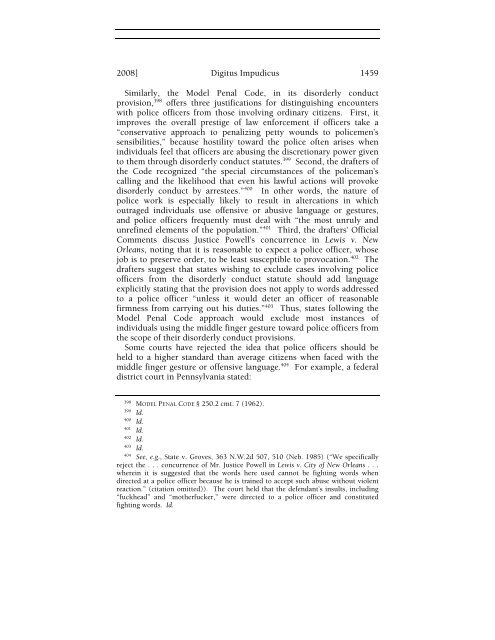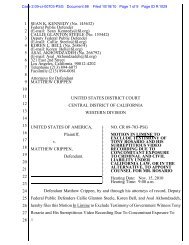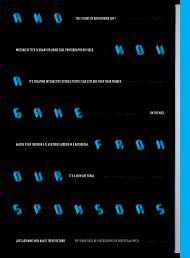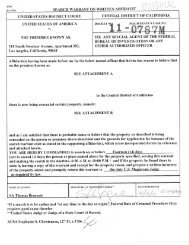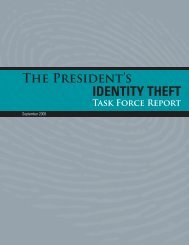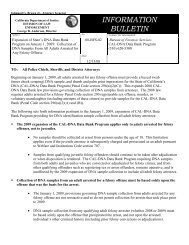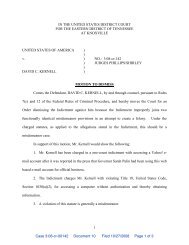Digitus Impudicus: The Middle Finger and the Law - Wired
Digitus Impudicus: The Middle Finger and the Law - Wired
Digitus Impudicus: The Middle Finger and the Law - Wired
You also want an ePaper? Increase the reach of your titles
YUMPU automatically turns print PDFs into web optimized ePapers that Google loves.
2008] <strong>Digitus</strong> <strong>Impudicus</strong> 1459<br />
Similarly, <strong>the</strong> Model Penal Code, in its disorderly conduct<br />
provision, 398 offers three justifications for distinguishing encounters<br />
with police officers from those involving ordinary citizens. First, it<br />
improves <strong>the</strong> overall prestige of law enforcement if officers take a<br />
“conservative approach to penalizing petty wounds to policemen’s<br />
sensibilities,” because hostility toward <strong>the</strong> police often arises when<br />
individuals feel that officers are abusing <strong>the</strong> discretionary power given<br />
to <strong>the</strong>m through disorderly conduct statutes. 399 Second, <strong>the</strong> drafters of<br />
<strong>the</strong> Code recognized “<strong>the</strong> special circumstances of <strong>the</strong> policeman’s<br />
calling <strong>and</strong> <strong>the</strong> likelihood that even his lawful actions will provoke<br />
disorderly conduct by arrestees.” 400 In o<strong>the</strong>r words, <strong>the</strong> nature of<br />
police work is especially likely to result in altercations in which<br />
outraged individuals use offensive or abusive language or gestures,<br />
<strong>and</strong> police officers frequently must deal with “<strong>the</strong> most unruly <strong>and</strong><br />
unrefined elements of <strong>the</strong> population.” 401 Third, <strong>the</strong> drafters’ Official<br />
Comments discuss Justice Powell’s concurrence in Lewis v. New<br />
Orleans, noting that it is reasonable to expect a police officer, whose<br />
job is to preserve order, to be least susceptible to provocation. 402 <strong>The</strong><br />
drafters suggest that states wishing to exclude cases involving police<br />
officers from <strong>the</strong> disorderly conduct statute should add language<br />
explicitly stating that <strong>the</strong> provision does not apply to words addressed<br />
to a police officer “unless it would deter an officer of reasonable<br />
firmness from carrying out his duties.” 403 Thus, states following <strong>the</strong><br />
Model Penal Code approach would exclude most instances of<br />
individuals using <strong>the</strong> middle finger gesture toward police officers from<br />
<strong>the</strong> scope of <strong>the</strong>ir disorderly conduct provisions.<br />
Some courts have rejected <strong>the</strong> idea that police officers should be<br />
held to a higher st<strong>and</strong>ard than average citizens when faced with <strong>the</strong><br />
middle finger gesture or offensive language. 404 For example, a federal<br />
district court in Pennsylvania stated:<br />
398<br />
MODEL PENAL CODE § 250.2 cmt. 7 (1962).<br />
399 Id.<br />
400 Id.<br />
401 Id.<br />
402 Id.<br />
403 Id.<br />
404 See, e.g., State v. Groves, 363 N.W.2d 507, 510 (Neb. 1985) (“We specifically<br />
reject <strong>the</strong> . . . concurrence of Mr. Justice Powell in Lewis v. City of New Orleans . . .<br />
wherein it is suggested that <strong>the</strong> words here used cannot be fighting words when<br />
directed at a police officer because he is trained to accept such abuse without violent<br />
reaction.” (citation omitted)). <strong>The</strong> court held that <strong>the</strong> defendant’s insults, including<br />
“fuckhead” <strong>and</strong> “mo<strong>the</strong>rfucker,” were directed to a police officer <strong>and</strong> constituted<br />
fighting words. Id.


